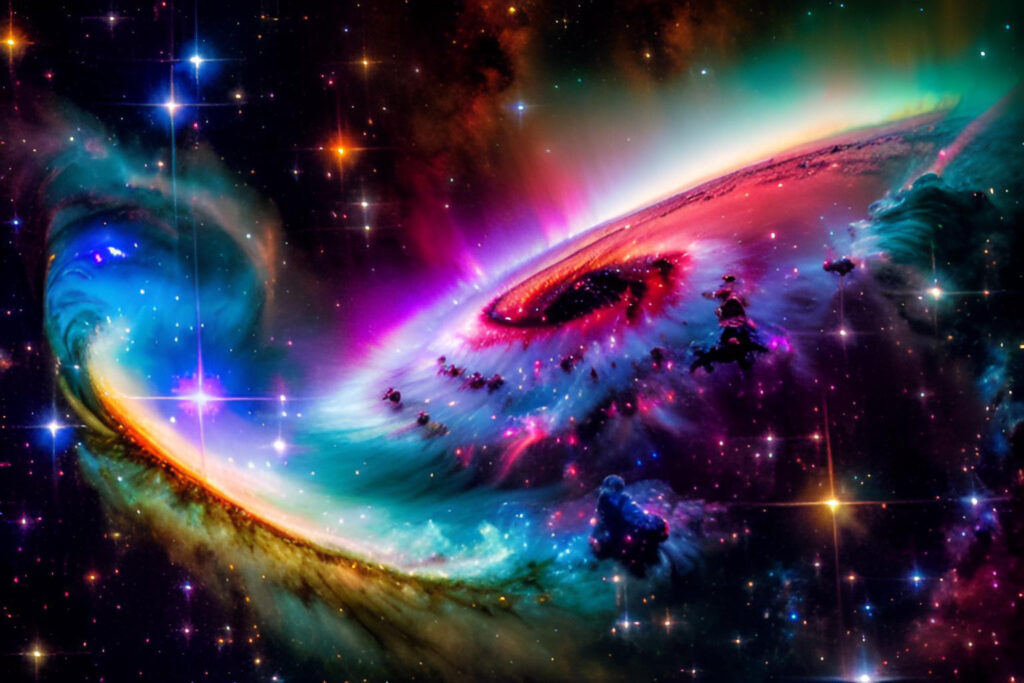In terms of our origins and this debate of Creation vs. Evolution, at the end of the day, it comes down to the beginning, which is why the iconic intro to Genesis begins with answering the very question of “the beginning.” Our understanding of the very existence of God is intrinsically tied to this issue of our origins.
In this article, I’ll look at a few arguments concerning cosmology and the logical end of their sums.
Some Evolutionists reject the idea that there was “nothing” in the beginning, but that matter always existed:
“The logical conclusion is that at some point, all matter started from a single point a few millimetres across before exploding outward.” [source]
Others say that the universe expands and contracts in a never-ending cycle, known as the cyclic model of the universe.
The glaring reality here is that even if this were true, this still relies on there being “something” to begin with.
Both theories presupposes pre-existing matter:
“Essentially, what was once a tiny, packed-together universe expanded out rapidly…” [source]
Even if the whole of creation contracts into the space of a grain of sand, it’s still SOMETHING!
Both of these fail to answer (or even tackle) the question of how the visible universe got here to begin with! Although, that isn’t really surprising, given the lack of logical answers outside of an omnipotent, omniscient, eternal God; something evolutionists avoid like the plague, against all reason.
The lack of a logical explanation for how everything got here, particularly something that can be observed in the natural world, is in itself a strong case for the source of everything being outside the visible, natural world. More on this later.
Additionally, we don’t see something coming from nothing in the natural world.
To compound matters, these days, they’re saying that instead of something impossible happening once (Big Bang, matter from nothing), it allegedly happened multiple times (multiple Big Bangs) across the universe… 🙄
This is without even bringing the intelligent design arguments to bear on the subject. When you bring in the arguments for intelligent design, the already floundering Big Bang (and related) theories take a sharp nose dive.
Also, concerning the cyclic model, the “no beginning, no end” part not-so-mysteriously describes the very nature of God! Imagine that!
But the evolutionist is like, “oh no! We can’t say that!”
I have a big smile on my face! 😆
It’s like God embedded His fingerprint into the very logic of the universe to confound the unbelievers, while simultaneously enamoring and mystifying the elect He has called.

Let’s be clear, the Bible doesn’t say there was nothing in the beginning, but rather that there was God (Genesis 1:1-5 & John 1:1-2). So, when I refer to nothingness, I refer to it in the physical sense.
I’m saying that everything came from nothing in the physical realm, but I’m also saying that everything came from something in the spiritual realm.
Saying that God created everything is also saying that something came from something, but the difference is that we don’t see matter coming from nothing normatively in the natural world. Moreover, we don’t see unintelligent things generating new things or bringing order to chaos.
Given that the alleged bent of the atheist is the use of science as a means of proof, one would assume they would demand of themselves actual observation of the things they allege.
Instead, they are basically saying that something came from nothing in the physical realm, or that it always was. Both of these phenomenon are not scientifically unobserved and therefore violates the very scientific method atheistic evolutionists purport to validate their views.
Again, I’m saying that everything came from nothing in the physical realm, yet everything came from something in the spiritual realm.
Because we don’t know much about the spiritual realm (potentially quantum realm or other dimensions), this leaves this in the realm of the unknown.
You could potentially claim the same thing about the quantum realm randomly generating matter, but the difference comes down to intelligent design.
Additionally, some may say it’s not necessary that there was “nothing” to begin with, but that matter could always have existed. That notion undermines the entire point. The point is about “something”…specifically where that something came from. The origins of the visible universe.
So, at this point, the level of faith required to believe in either is about the same. Faith in God or faith in everything having already existed…um, somehow…randomly…magically…
I’ve also had people ask, “then who made God?” or “where did God come from?” …as if they have me with these questions.
First, this argument is shortsighted.
If one asks that question, they have to ask where the next one came from, then on and on.
This is the fallacy of infinite regress.
That proposition is an invalid line of reasoning. So no, asking “who made God” is not what we should be asking, because it’s impossible to get an answer from that line of questioning.
Some may also allege that the existence of God is an infinite regress, but the argument for God is a bit different, because we know that matter doesn’t appear out of thin air and we know that we can’t repeatedly ask the infinitive question of “who made God.“
However, it is entirely possible for us to not fully understand God’s infinitive nature, but it still be so. In fact, our ignorance and finite perspective is the most likely common denominator, which I’ll cover later in greater detail.
Furthermore, we know that there must be an answer to where everything came from, whether we know it or not, or whether we are or are not capable of understanding it.
Atheists have proven on my social threads that they can’t give a logically plausible answer for how there was a spec of matter that expanded into everything, or where matter itself even came from.
Second, it takes faith to believe in both God and everything already existing, because we can’t physically observe either, at least not in an empirical manner.
Yet, they demand empirical proof of God, but don’t have so much as a rational theory on how even matter and the visible universe came into being. That notion is indelibly preposterous.

We experience time linearly. God's infinite nature is admittedly very difficult to comprehend, given our finite linear perspective.
But an all-knowing God would already know every thought He ever thought or would ever think, all in the same exact moment.
Except that one moment is no different than the next moment. Then the moment after that is no different than any other moment, because nothing is new.
I’m giving the example in a moment by moment format, because of our limited understanding, but the infinitive nature of God is like one moment or state of being that is outside of time. Nothing can be added to it, because He is all-powerful and all-knowing.
If you already know everything, you have already experienced everything. You would have a map of it in your head and you would already know every thought and feeling that you had about everything that ever happened.
He's not in the flow of time. He's outside of it!
We are bound by time’s linear nature, but logically speaking, if there is a God (which, of course, I believe there is), His omniscient nature would preclude that He isn’t bound by the linear nature of time.
If that’s the case, we can say God primarily exists in something like a single moment outside of time, because when everything is known there is nothing to experience.
Events cannot unfold for Him. Nothing can surprise Him. Nothing is ever different for Him.
He just IS.
Time is an expression…a creation…a dimension He sets up, quite outside of the state of His original nature.
When I say that He exists "primarily" outside of His creation, I'm talking about the very NATURE of God, His original state, not just His manifest form. He can appear anywhere at any time. Given that He knows every event and detail, He is simultaneously connected to every location throughout space and time.
He can weave into one time and place, then weave out of it and into another, much like a needle and thread weaves in and out of fabric. Except that because He is omnipotent, He can do that in every time and space all at the same exact time. In a sense, I would say that His omnipresent nature is a latent byproduct of His omnipotence and omniscience. His omnipotent nature necessitates His omniscient nature. How could He be all-powerful if He couldn't be everywhere at once?
So, because He is omnipresent, it's entirely possible for Him to be both outside of time and space, yet still be inside of it too.
The cosmos we live in has a bearing on our perception. Outside of this cosmos, other perceptions can exist; other rules and other realities.
You might compare it like this: On Earth, we can’t float around, because we are affected by gravity. But when we go into space, we can float. The rules haven’t changed, but the effect of them has. Gravity still exists, but the effects of gravity are not felt.
The reason those rules have not changed, is because the person on Earth and the person in space are still in the same cosmos.
What Christians believe is that the cosmos itself is a creation of God and therefore He is beyond it, which means that everything we think we know about what is possible is confined to the limited perception possible from within that cosmos.
Once outside of that cosmos, the rules change. It’s like the theory (and mathematics) of multiple dimensions.
In this widely recognized video, a high school student gives an explanation of how the 4th dimension would appear:
In the video, he gives an explanation of what a two-dimensional being would perceive and how the two-dimensional perspective obviously isn’t correct from a three-dimensional perspective.
During this explanation, he states, “since we can actually see it from the three-dimensional world, and perceive things to be in two dimensions, we can see things for how they actually are.”
Now, let’s parallel this with God being outside of our cosmos and possibly on a completely different dimensional plane.
In this case, God would see things as they really are and we would be limited to our three-dimensional existence.
Mathematically, dimensions beyond our own do work, even up to 21 dimensions. It's possible that God exists on a dimension higher than ours.
Now, I'm hypothesizing at this point, of course. But, if this is the case, then it makes for an interesting point.
A two-dimensional being would exist on the first and second dimensions, but not on the third dimension. Yet, a three-dimensional being exists on all three. Therefore, if God exists on a higher dimension, then He would also exist on every other dimension under it. Given that God is omnipotent, we could then conclude that He would exist on the highest possible dimension.
Yet, we would not understand that dimension or what is possible within and from that dimension.
Regardless of whether or not He exists on some higher dimensional realm, His omniscient nature precludes that He doesn't experience time like we do. This aspect of His nature indefinitely makes Him separate and distinct from any other being. He is completely unique. In that regard, He always has that part of Himself that is completely separated from everything.
There is none like Him.
Yet, simultaneously He has built everything around Himself. This is proof that God desires relationship with His creation. He is high above His creation (speaking of stature), but He is with His creation also, because of His desire for relationship.
What appears to the atheist to be impossible, may very well be completely possible, but the perception of mankind is limited.
So, then why should an atheist believe in a dimensional perspective of a God they can’t directly see or scientifically quantify?
The answer is in the fact that, despite all of their desperate extrapolations, they still cannot answer where everything came from. Nor will they ever in any scientific sense.
The atheist wants an answer within the realm of their understanding, but that does not exist.
Their hypotheses of matter always existing...or everything suddenly coming into being with all of the laws of the universe somehow all being consistent across time and space...these theses are not logically possible.
In the absence of a rational, material explanation…one cannot hold to these things. The logic points to another dimension, where an intelligent designer exists by laws that we cannot fully understand.
This question of God and the origins of everything extends beyond our abilities of comprehension. But, it is in the incomprehensibility of the subject, that we see God staring at us, as if to say, “here I am.”
The unknown and unexplainable aspect...the inexplicability of our origins, from a naturalistic perspective demands one look outside of our known understanding for the truth.
Logic precludes that the arguments made by evolutionists are not rationally possible. Yet the argument that God’s infinitive nature is beyond our comprehension is completely possible.
As I stated in the beginning (of this article, of course), at the end of the day, it comes down to the beginning (of our origins, of course).
Regardless of which view you hold, something essentially came from nothing or always was; either God, or matter.
There is nothing in the natural world that gives rise to believe that matter came from nothing.
Therefore, it’s more logical to be open to the possibility of there being an answer in the spiritual (perhaps quantum) realm.
Given that the argument for an Intelligent Creator is more logically plausible, the burden of proof is on the atheist; and it’s a burden that their illogical extrapolations have not began to accomplish.
As mysterious as it is, an all-powerful, pre-existent, eternal God is the best answer out there that even tackles all of the aspects of the question, “where did everything we see come from.”
-JCF
